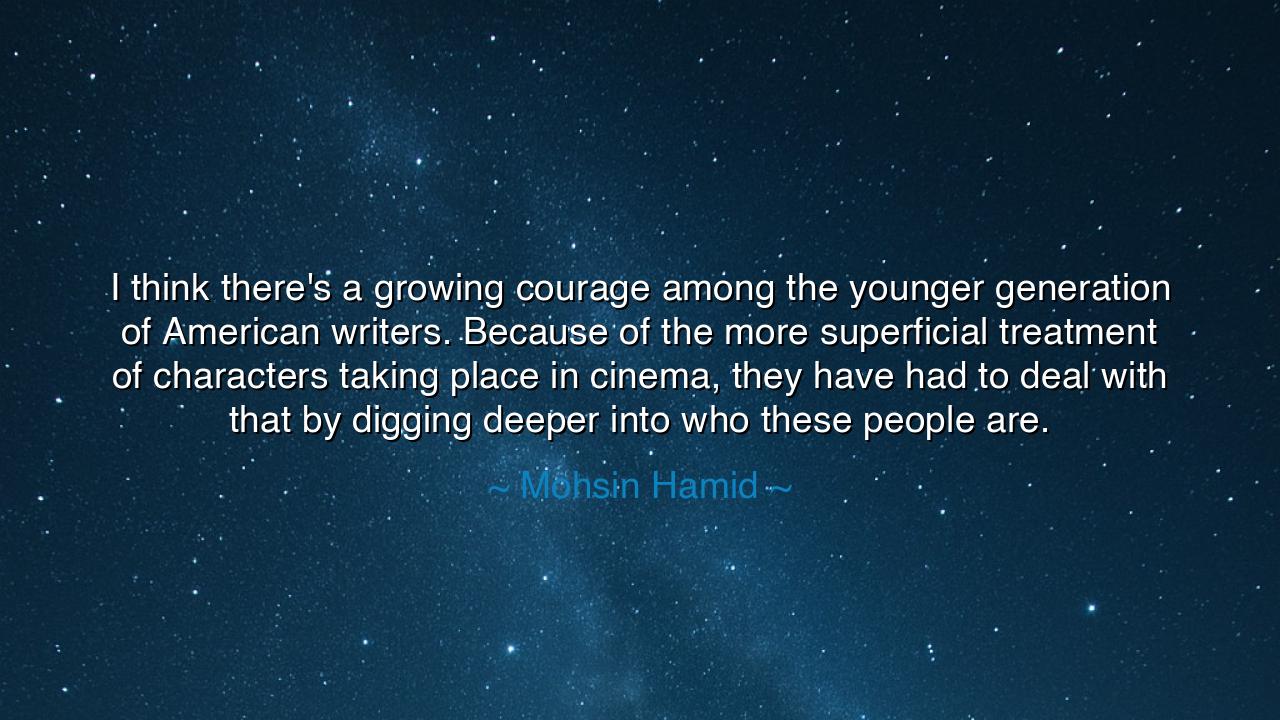
I think there's a growing courage among the younger generation of
I think there's a growing courage among the younger generation of American writers. Because of the more superficial treatment of characters taking place in cinema, they have had to deal with that by digging deeper into who these people are.






The novelist Mohsin Hamid, whose words bridge East and West, once said: “I think there's a growing courage among the younger generation of American writers. Because of the more superficial treatment of characters taking place in cinema, they have had to deal with that by digging deeper into who these people are.” In this observation, he speaks not merely of literature, but of the spirit of art itself—the eternal struggle between surface and depth, between illusion and truth. Hamid, who has long explored identity, migration, and belonging, reminds us that every age must reclaim its humanity from the forces that seek to flatten it. In his eyes, the new generation of writers is rising to that sacred task, not through rebellion alone, but through courage—the courage to look inward, to reveal the soul beneath the spectacle.
The meaning of his words lies in the contrast between two kinds of storytelling: the superficial and the profound. In much of modern cinema, Hamid sees a world of glittering surfaces—stories that dazzle the eye but seldom touch the heart. Characters are drawn in broad strokes, reduced to symbols, consumed by spectacle. Yet in reaction to this, he observes a resurgence of depth in the young writers of America, who are reaching beyond the shallow to uncover the intricate landscapes of the human condition. The writer’s courage, in his view, is not in creating heroes or villains, but in revealing the vulnerable truth of being human—to show not what people seem to be, but who they truly are when all masks are stripped away.
The origin of Hamid’s insight can be traced to his own journey as a writer born in Pakistan, educated in the United States, and living between cultures. In novels such as The Reluctant Fundamentalist and Exit West, he confronts the collision between globalization and individuality—the tension between what the modern world projects and what the human heart conceals. Having witnessed both the storytelling grandeur of Western cinema and the quiet, introspective art of literature, Hamid recognizes that when one medium grows hollow, another must rise to restore depth. Thus, he celebrates the writers who are not afraid to dig, to question, and to humanize in an era of noise.
Throughout history, art has always been shaped by this tension. When the world grows loud, the artist’s duty is to listen. When the world grows shallow, the artist must dive deeper. Consider the Renaissance: while politics and power were consumed by spectacle, artists like Michelangelo and Shakespeare turned inward to reveal the divine within man. Michelangelo’s David was not just a statue of victory—it was the human spirit carved from stone. Shakespeare’s Hamlet was not a prince of action, but a mirror of human thought and doubt. They, too, lived in an age of surface, yet found immortality in depth. So too, Hamid tells us, must our writers of today confront the superficiality of their time by daring to explore the inner life.
To dig deeper, as Hamid suggests, requires courage. It is easier to entertain than to enlighten, easier to please than to provoke. The writer who seeks truth must face rejection, misunderstanding, and solitude. Yet in that solitude lies power—the power to speak honestly about fear, longing, identity, and pain. The younger generation he praises is one that writes not to escape reality, but to transform it; not to create illusions, but to awaken empathy. In doing so, they resist a culture that values noise over meaning, speed over reflection, spectacle over soul.
The lesson, then, is not for writers alone, but for all who live in this age of distraction. Every person today faces the temptation to live superficially—to skim through life’s pages rather than read them deeply. But Hamid’s wisdom calls us to slow down, to listen, to look beyond appearances. Whether in art, in friendship, or in our own self-understanding, we must find the courage to see truly—to recognize the complexity of others and the mystery within ourselves.
So, let us remember this: the superficial world may dazzle for a moment, but only depth endures. Let us, like the young writers Hamid admires, learn to dig deeper—in our work, in our relationships, in our understanding of humanity. The courage to explore the soul is the only path to truth. For when we dare to look beneath the surface, we rediscover what is eternal in man: his longing for meaning, his capacity for compassion, and his endless quest to know himself. And that, as Mohsin Hamid teaches, is the greatest art of all—the art of being human in a world that too often forgets what that means.






AAdministratorAdministrator
Welcome, honored guests. Please leave a comment, we will respond soon